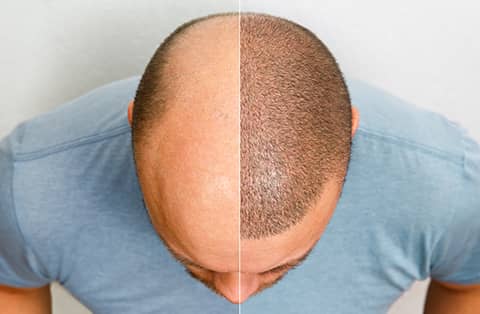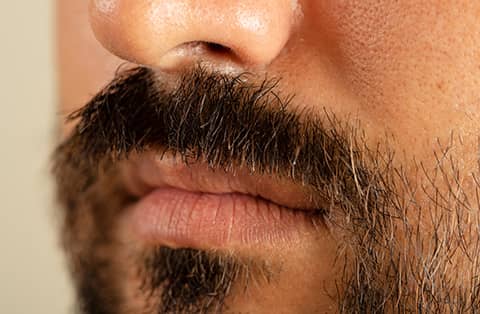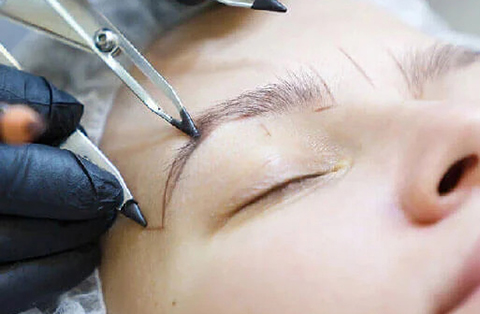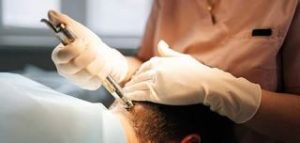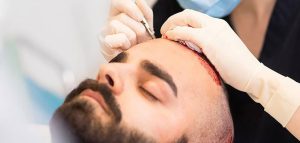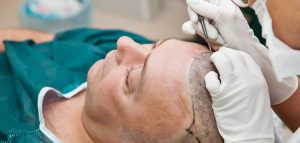Hair loss, a concern affecting numerous individuals globally, transcends mere aesthetic implications, often bearing significant emotional and psychological impact. This condition, characterized by the thinning or loss of hair, can stem from a myriad of factors, ranging from genetic predisposition to lifestyle influences. However, an often-overlooked aspect in the etiology of hair loss is the role of vitamin deficiencies.
Vitamins, essential micronutrients, play pivotal roles in maintaining overall health, including the health of hair. They are crucial in supporting various biological processes that ensure the growth and sustenance of healthy hair. Deficiencies in specific vitamins, such as Vitamin D, B12, and iron, have been closely linked to various forms of hair loss, including thinning, baldness, and the weakening of hair strands. Understanding the intricate relationship between vitamin levels and hair health is fundamental in addressing hair loss effectively.
In this context, our focus will delve into the nuances of how deficiencies in key vitamins can lead to hair loss, exploring the underlying mechanisms and offering insights into remedial measures. By comprehending the significance of vitamins in hair health, individuals can better navigate the path to restoring and maintaining robust hair growth, thereby mitigating the distress associated with hair loss.
Understanding Hair Loss
Definition and General Causes of Hair Loss
Hair loss, medically termed as alopecia, is a condition characterized by the thinning or complete absence of hair where it normally grows. This phenomenon can manifest in various forms, ranging from a gradual thinning atop the head to more pronounced baldness or patchy hair loss.
The etiology of hair loss is multifaceted, encompassing genetic factors, aging, hormonal imbalances, and medical conditions. Additionally, external factors such as stress, nutritional deficiencies, and certain hair care practices can contribute to this condition.
Key causes of hair loss include:
- Genetic Predisposition: Often observed in male and female pattern baldness.
- Hormonal Changes: Conditions like pregnancy, menopause, or thyroid problems can trigger hair loss.
- Medical Conditions: Scalp infections, alopecia areata, and other diseases can lead to hair loss.
- Medications and Supplements: Certain drugs used for cancer, arthritis, depression, heart problems, and high blood pressure may cause hair loss.
- Stressful Events: Emotional or physical stress can result in temporary hair thinning.
- Hairstyling and Treatments: Excessive hairstyling or harsh hair treatments can cause hair thinning and breakage.
Differentiating Between Temporary and Permanent Hair Loss
Understanding the distinction between temporary and permanent hair loss is crucial for effective management and treatment.
- Temporary Hair Loss: Often a result of factors such as stress, nutritional deficiencies, certain medications, or medical conditions. This type of hair loss is typically reversible once the underlying cause is addressed. For instance, hair loss due to iron deficiency or stress may cease with the restoration of iron levels or the alleviation of stressors.
- Permanent Hair Loss: Generally attributed to genetic factors, hormonal changes, or scarring alopecias. In these cases, hair follicles are either lost or severely damaged, making natural regrowth challenging. Male and female pattern baldness, where hair loss follows a specific pattern, is a common example of permanent hair loss.
While temporary hair loss can often be remedied by addressing the root cause, permanent hair loss may require more intensive treatments such as medication, laser therapy, or surgical options like hair transplantation. Understanding the nature of hair loss is a critical step in seeking appropriate treatment and managing patient expectations.
The Role of Vitamins in Hair Health
Overview of How Vitamins Contribute to Hair Growth and Scalp Health
Vitamins play an indispensable role in maintaining the health of hair and scalp, influencing hair growth, texture, and overall hair integrity. Each vitamin contributes uniquely to the complex process of hair development and maintenance:
- Vitamin D: This vitamin is crucial for the creation of new hair follicles, the tiny pores from which new hairs grow. Vitamin D deficiency has been linked to alopecia, a medical term for hair loss, and may be a factor in preventing hair follicles from regenerating.
- Vitamin B12: Essential for hair growth, Vitamin B12 aids in the production of oxygen-rich red blood cells, which feed hair follicles. Its deficiency can lead to hair thinning and hair loss.
- Iron: While not a vitamin, iron’s role in hair health is significant. It helps red blood cells carry oxygen to cells, including hair follicles, essential for healthy hair growth.
- Vitamin A: All cells need vitamin A for growth, including hair, the fastest growing tissue in the human body. Vitamin A also helps skin glands produce sebum, which moisturizes the scalp and keeps hair healthy.
- Vitamin E: Known for its antioxidant properties, Vitamin E can prevent oxidative stress in the scalp, which is linked to hair loss.
- Biotin (Vitamin B7): Part of the Vitamin B family, biotin is known for its role in hair growth. Deficiencies, though rare, can lead to thinning of the hair.
The Hair Growth Cycle and the Influence of Vitamins
The hair growth cycle comprises three distinct stages: anagen (growth phase), catagen (transitional phase), and telogen (resting phase). Vitamins impact each of these stages:
- Anagen Phase: Vitamins like Biotin and Vitamin D play a significant role in elongating the anagen phase, promoting longer periods of hair growth.
- Catagen Phase: This phase involves the regression of the hair follicle. Adequate levels of vitamins, especially Vitamin E and Vitamin A, are essential for the health of the hair follicle during this transitional phase.
- Telogen Phase: During the resting phase, vitamins continue to support the hair follicle’s health. Deficiencies in essential vitamins during this phase can lead to hair thinning and increased hair loss.
A balanced intake of these vitamins is crucial for maintaining a healthy hair growth cycle and overall scalp health. Deficiencies in these key vitamins can disrupt the hair growth cycle, leading to conditions like hair thinning, baldness, and vitamin deficiency hair loss. Therefore, ensuring adequate vitamin intake either through diet or supplementation is vital for those seeking to maintain or improve their hair health.
Key Vitamin Deficiencies Linked to Hair Loss
Vitamin D Deficiency
- Role in Hair Follicle Health: Vitamin D plays a critical role in the creation and nurturing of new hair follicles, the structures that give rise to hair.
- Symptoms and Diagnosis: Symptoms include hair thinning and loss. Diagnosis typically involves blood tests to measure serum Vitamin D levels.
- Treatment and Prevention: Treatment includes Vitamin D supplementation and increased exposure to sunlight. Preventive measures involve a balanced diet with Vitamin D-rich foods and responsible sun exposure.
Vitamin B12 Deficiency
- Importance in DNA Synthesis and Red Blood Cell Production: Vitamin B12 is vital for healthy red blood cell production and DNA synthesis, both crucial for hair growth and health.
- Identifying Deficiency and Corrective Measures: Symptoms include hair loss and fatigue. Blood tests can diagnose this deficiency. Treatment involves dietary adjustments and supplementation.
Iron Deficiency
- Iron’s Role in Hair Follicle Nourishment: Iron helps in oxygen transport to hair follicles, essential for hair growth and strength.
- Recognizing and Addressing Iron Deficiency: Symptoms include hair loss and anemia. Iron levels can be checked through blood tests. Treatment includes iron-rich foods and supplements.
Vitamin A
- Balancing Vitamin A Levels for Hair Health: Vitamin A aids in sebum production, keeping the scalp moisturized and hair healthy.
- Risks of Over-Supplementation: Excessive Vitamin A can lead to hair loss. It’s crucial to maintain a balance through diet and avoid over-supplementation.
Vitamin E
- Antioxidant Properties and Scalp Health: Vitamin E’s antioxidant properties protect the scalp from oxidative stress, a contributor to hair loss.
- Sources and Supplementation: Rich sources include nuts and seeds. Supplements can be used under medical guidance.
Vitamin C
- Role in Collagen Production and Iron Absorption: Essential for collagen production, Vitamin C also aids in iron absorption, both crucial for hair health.
- Dietary Sources and Supplements: Citrus fruits, strawberries, and bell peppers are rich sources. Supplements can be used to address deficiencies.
Biotin (Vitamin B7)
- Biotin’s Role in Keratin Production: Biotin is essential for keratin production, a fundamental protein for hair health.
- Addressing Biotin Deficiency: Symptoms include hair thinning. Treatment involves biotin-rich foods and supplements.
Zinc
- Zinc in Tissue Growth and Repair: Zinc plays a vital role in hair tissue growth and repair and keeps the oil glands around follicles working properly.
- Identifying and Treating Zinc Deficiency: Symptoms include hair loss. Diagnosis is through blood tests, and treatment involves dietary adjustments and supplements.
Folic Acid (Vitamin B9)
- Importance in Cell Division and Hair Growth: Folic acid is crucial for healthy cell division, which affects hair growth and regeneration.
- Dietary Sources and Supplements: Leafy greens, citrus fruits, and beans are rich in folic acid. Supplements can help in deficiency.
Each of these vitamins plays a unique role in maintaining hair health. Deficiencies can lead to hair loss, emphasizing the importance of a balanced diet and, in some cases, supplementation under medical guidance. Regular health check-ups can help in early identification and treatment of these deficiencies, thereby preventing hair loss associated with them.
Additional Factors Contributing to Hair Loss
Hormonal Imbalances and Genetics
- Hormonal Imbalances: Hormones play a pivotal role in regulating hair growth. Imbalances, particularly in androgens, can lead to hair thinning and loss. Conditions such as polycystic ovary syndrome (PCOS), thyroid disorders, and menopause can significantly alter hormone levels, impacting hair health.
- Genetics: Genetic predisposition is a key factor in hair loss, especially in male and female pattern baldness, scientifically known as androgenetic alopecia. This hereditary condition is characterized by a progressive reduction in hair strand diameter, length, and pigment.
Stress and Environmental Factors
- Stress: Both physical and emotional stress can trigger a type of hair loss known as telogen effluvium. High stress levels can push hair follicles into a resting phase, leading to noticeable hair shedding and thinning.
- Environmental Factors: Exposure to environmental stressors such as pollutants, UV radiation, and harsh climatic conditions can contribute to hair damage and loss. These factors can lead to oxidative stress, which negatively impacts hair follicles.
Impact of Certain Medications and Medical Treatments
- Medications: Various medications, including chemotherapy drugs, blood thinners, beta-blockers, and certain birth control pills, can cause temporary or permanent hair loss as a side effect.
- Medical Treatments: Treatments such as chemotherapy and radiation therapy, often used in cancer treatment, can lead to significant hair loss. This is due to their impact on rapidly dividing cells, including those in hair follicles.
While vitamin deficiencies are significant contributors to hair loss, it is essential to consider these additional factors. Hormonal imbalances, genetic predisposition, stress, environmental factors, and certain medications and medical treatments can all play a role in hair health.
Understanding these factors is crucial for a comprehensive approach to diagnosing and treating hair loss.
Diagnosing Vitamin Deficiencies
Recommended Tests and Screenings
- Blood Tests: The most definitive method for diagnosing vitamin deficiencies is through blood tests. These tests can accurately measure levels of specific vitamins such as Vitamin D, B12, iron, and others, providing a clear picture of any deficiencies that may contribute to hair loss.
- Scalp Analysis: In some cases, a healthcare provider may perform a scalp examination to assess the health of the hair follicles and identify any signs of deficiency-related hair loss.
- Dietary Assessment: A thorough evaluation of dietary habits can be conducted to identify potential nutritional gaps that could lead to vitamin deficiencies.
When to Consult a Healthcare Provider?
- Noticeable Hair Thinning or Loss: If you experience significant hair thinning or a sudden increase in hair loss, it is advisable to consult a healthcare provider. This is particularly important if hair loss is accompanied by other symptoms such as fatigue, skin changes, or brittle nails, which could indicate a vitamin deficiency.
- Before Starting Supplements: Before beginning any vitamin supplements for hair loss, consulting with a healthcare provider is crucial. They can recommend appropriate tests to determine if a deficiency exists and advise on the correct dosage and type of supplement needed.
- Persistent Symptoms Despite Over-the-Counter Treatments: If over-the-counter treatments for hair loss, such as minoxidil, do not yield results, it may be indicative of an underlying vitamin deficiency or other health issue that requires professional assessment.
In summary, diagnosing vitamin deficiencies involves a combination of blood tests, scalp analysis, and dietary assessments. It is essential to consult a healthcare provider for an accurate diagnosis and appropriate treatment plan, especially when experiencing significant hair loss or before starting any new supplements. Early detection and treatment of vitamin deficiencies can significantly improve hair health and prevent further hair loss.
Treatment and Management
Dietary Changes for Improved Vitamin Intake
- Balanced Diet: Incorporating a balanced diet rich in essential vitamins and minerals is fundamental in managing and preventing hair loss. Foods high in Vitamin D, B12, iron, and biotin should be included. Examples include leafy greens, nuts, seeds, fish, eggs, and dairy products.
- Specific Nutrient Focus: For targeted hair health, focus on nutrients known to benefit hair growth. This includes omega-3 fatty acids, zinc, and antioxidants, which can be found in foods like salmon, avocados, berries, and whole grains.
- Consistency and Variety: Consistently consuming a variety of nutrient-rich foods ensures a comprehensive intake of all necessary vitamins and minerals for hair health.
The Role of Supplements in Managing Deficiencies
- Supplemental Support: When dietary changes are insufficient or if specific deficiencies are diagnosed, supplements can play a crucial role. Vitamin D, iron, biotin, and zinc supplements, for example, can be beneficial in specific dosages as prescribed by a healthcare provider.
- Personalized Supplementation: It’s important to tailor supplementation to individual needs based on diagnostic results. Over-supplementation can be harmful, so professional guidance is essential.
- Monitoring and Adjustment: Regular monitoring of vitamin levels through follow-up tests is crucial to adjust supplement intake as needed and to assess the effectiveness of the treatment.
Hair Transplantation
- When to Consider: Hair transplantation is considered in cases of permanent hair loss where medical treatments and lifestyle changes have not been effective, particularly in androgenetic alopecia.
- The Procedure: This surgical procedure involves transplanting hair follicles from one part of the scalp (or body) to the balding or thinning areas. It can restore the appearance of fuller hair.
- Consultation and Evaluation: A thorough consultation with a hair restoration specialist is necessary to evaluate suitability for the procedure, understand the potential outcomes, and discuss the risks and benefits.
The management of hair loss due to vitamin deficiencies involves a multifaceted approach, including dietary changes, appropriate supplementation, and in some cases, hair transplantation. It is crucial to approach treatment with a patient-centric focus, considering individual dietary needs, health conditions, and the specific nature of the hair loss. Regular consultations with healthcare providers ensure a safe and effective treatment plan.
Preventive Measures
Tips for Maintaining a Balanced Diet Rich in Essential Vitamins
- Diverse Food Selection: Incorporate a wide range of foods in your diet to ensure a comprehensive intake of essential vitamins. Include fruits, vegetables, lean proteins, whole grains, and healthy fats.
- Focus on Vitamin-Rich Foods: Emphasize foods high in vitamins linked to hair health. For instance, fatty fish, eggs, and fortified foods for Vitamin D; red meat, poultry, and fortified cereals for iron; dairy products, eggs, and meat for Vitamin B12; nuts and seeds for Vitamin E; and citrus fruits for Vitamin C.
- Regular Meals: Eating regular, balanced meals helps maintain steady nutrient levels in the body, supporting hair growth and overall health.
- Hydration: Adequate water intake is crucial for maintaining healthy hair and scalp as it supports the absorption of vitamins and minerals.
Understanding the Importance of Regular Health Check-Ups
- Early Detection of Deficiencies: Regular health check-ups can help in the early detection of vitamin deficiencies that may lead to hair loss. This allows for timely intervention and treatment.
- Personalized Health Advice: Healthcare providers can offer personalized dietary and lifestyle advice based on individual health assessments, ensuring a targeted approach to preventing hair loss.
- Monitoring Overall Health: Regular check-ups provide an opportunity to monitor overall health, including hormone levels and other factors that could influence hair health.
- Adjusting to Life Changes: As the body undergoes various changes with age, health check-ups help in adjusting dietary and lifestyle habits to meet evolving health needs.
Preventive measures for hair loss due to vitamin deficiencies revolve around maintaining a balanced diet rich in essential vitamins and regular health check-ups. These practices not only support hair health but also contribute to overall well-being. By adopting a proactive approach to nutrition and health monitoring, individuals can significantly reduce the risk of hair loss related to vitamin deficiencies.
Conclusion
In conclusion, addressing vitamin deficiencies is a critical aspect of maintaining hair health and preventing hair loss. Vitamins such as D, B12, iron, and others play indispensable roles in the growth, strength, and overall health of hair. Deficiencies in these key nutrients can lead to various hair issues, including thinning, baldness, and a general decline in hair quality.
It is essential to recognize that while a balanced diet rich in essential vitamins is fundamental to hair health, individual needs may vary. Factors such as genetics, hormonal imbalances, and environmental influences also significantly impact hair health. Therefore, a comprehensive approach that includes regular health check-ups, dietary adjustments, and appropriate supplementation is vital.
Healthcare providers can offer tailored recommendations based on individual health assessments, ensuring an effective and safe approach to managing hair health. They can also guide the appropriate use of supplements and other treatments, including advanced options like hair transplantation for cases of permanent hair loss.
Remember, taking proactive steps towards addressing vitamin deficiencies not only benefits your hair but also contributes to your overall well-being. Early intervention and consistent care are key to maintaining healthy, vibrant hair throughout your life.


